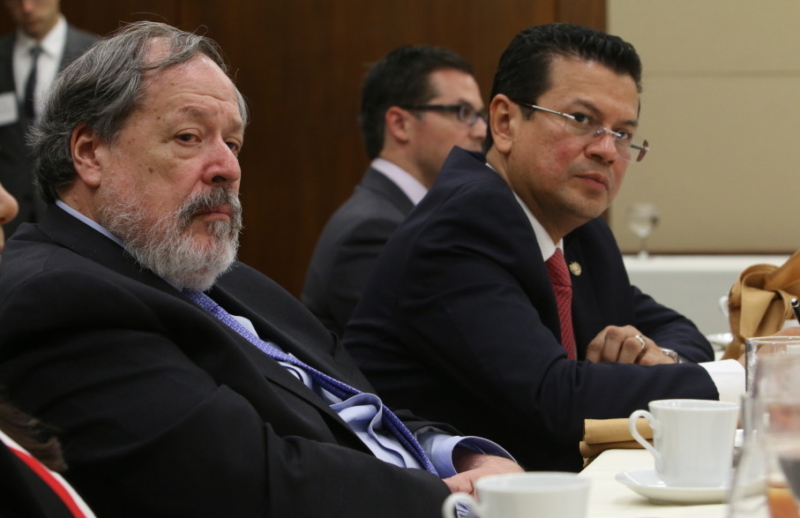What Do the US Election Results Mean for Latin America?
What do the election results mean for hemispheric policy and foreign relations?
On July 9, 2015, the Inter-American Dialogue's Congressional Program hosted a Congressional Members Working Group (CMWG) dinner on Capitol Hill. The dinner was co-hosted by a bi-partisan group of five Members of Congress: Tom Emmer (R-MN), Jeff Fortenberry (R-NE), Joaquin Castro (D-TX), Raúl Grijalva (D-AZ), and Norma Torres (D-CA). Four other representatives joined the dinner discussion: David Schweikert (R-AZ), Henry Cuellar (D-TX), Sam Farr (D-CA), and Nita Lowey (D-NY). The discussion was led by Hugo Martínez, the foreign affairs minister of El Salvador, and Roberta Jacobson, US assistant secretary of state for Western Hemisphere affairs.
Other distinguished guests included ambassadors from the northern tier countries of Central America, high-level government officials, policy professionals and experts, and members of civil society. For a full list of guests, refer to the Participants List link.
The key issues addressed during the discussion include: (1) the debate in the US Congress over the plan for financing the Alliance for Prosperity; (2) the prevalence of corruption and the lack of accountability and transparency in the region; (3) the unprecedented migration of unaccompanied minors from Central America; (4) the implications for and obstacles to increased cooperation within the region and with the United States; and (5) the need for simultaneous, not isolated, focus on each of the main goals of the Plan.
The outlook for the Northern Triangle is one of both optimism and apprehension. Most participants concluded that, while greater regional cooperation among El Salvador, Guatemala, and Honduras and with the United States could transform the region, the countries must also demonstrate legitimate and quantifiable progress as a condition of increased aid. Central America has historically faced pervasive corruption and the region’s leaders struggle to earn legitimacy and credibility. Participants in the dinner reached consensus on a key condition of continued US aid to the area: an assurance of the region’s commitment to accountability and transparency. Without this, American decision makers and taxpayers will not be convinced that an investment in the Northern Triangle through the Alliance for Prosperity is justified.
Representatives from the three countries also provided perspectives on the positive trends currently developing in the region. Rather than criticizing the region for the recent public protests and corruption scandals, the United States should see these developments as a positive change. Indeed, the absence of repressive government responses to citizen protests illustrates that Central American governments have begun to respond to civil society , rather than manipulating them as in the past. Similarly, while the number of government officials jailed for corruption charges has increased at a worrisome rate in the past few months, this trend could signal the judiciary’s increasing ability to hold decision makers accountable to their citizens.
Regional cooperation must work across several different levels to have a lasting impact on the Northern Triangle. Community-based action is necessary to generate change, the private sector needs to be invested in promoting this change, and certain macro-level conditions should be in place to foster an enabling environment. Similarly, to be effective, the Plan must simultaneously promote development in several key areas: guaranteeing economic opportunity, ensuring security, and bolstering good governance and institutional strength. Although it is more challenging to persuade decision makers to invest in all of these areas at the same time, isolated progress in just one area is ultimately unsustainable.
The participants agreed that the United States can and should have a role in this effort; investment from the United States is not just a source of funding, but also a sign of commitment to partnership with the region. Deeper cooperation could help foster long-term development in the region, as well as signal the United States’ commitment to the region which may encourage other countries to engage the Northern Triangle. Moreover, cooperation with the region is in the national interest of the United States; US national security depends on the stability of its neighbors. Increased funding for the Alliance for Prosperity is a pragmatic foreign policy decision for the United States government, and not an ill-advised handout.
What do the election results mean for hemispheric policy and foreign relations?
Will Central American governments spend the money effectively? Do the countries in the isthmus have a good plan to fight the drug cartels?
As the global financial crisis continues to alter US relations with the hemisphere, greater engagement in the region remains critical to US interests.
 Inter-American Dialogue
Inter-American Dialogue